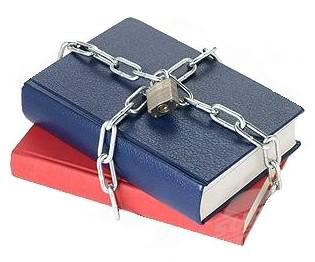
|  |  |  Entertainment | Books | November 2008 Entertainment | Books | November 2008  
Books Behaving Badly
 Ed Hutmacher - MexicoBookClub.com Ed Hutmacher - MexicoBookClub.com


| | Books can be ennobling, which is why we abhor censorship and book banning and fight the good fight to protect our freedom of speech. MexicoBookClub.com | | |
We're a couple of weeks into the online book study on Carlos Fuentes' novel The Old Gringo. Not surprisingly, the controversial author has become as much a curiosity to readers as his novel.

Foremost among the many queries is why The Old Gringo was banned from some public libraries in the United States, usually high school libraries. (Some readers apparently hadn't yet read the book's juicy parts.)

The short answer is that parts of Fuentes' book offended some parents who believe the graphic sexual content to be inappropriate for titillated-snooping teenagers who might hunt down the book in a public library or for beguiled high school students who read The Old Gringo to fulfill a literature course requirement.

The long answer has to do with context. If Fuentes' erotic passages are judged obscene apart from his whole 199-page novel, what is it about the context that might make the objectionable parts less controversial? Which poses a dilemma—how does one answer a sensible question about context and sexually explicit language when it's impossible to quote the controversial text in a family-oriented (or tourist-friendly) newspaper column? Most newspapers would never print even the mildest of Fuentes' graphic words.

Let me describe it this way: If a man were to whisper Fuentes' words in their daughter's ear or to a female co-worker at the office water cooler, he could be arrested for sexual assault, harassment or both. That's how explicit the narrative is.

Either way, Carlos Fuentes probably could care less. He is principally a novelist and, as such, he abides by different standards than newspaper columnists. I suspect that he and nearly every other novelist and free speech advocate will claim that book censorship of any kind is wrongheaded and that banning books is tantamount to Nazism.

Yet every year, according to the American Library Association, some 400 books are subjected to book-banning challenges for some reason or other. In 2007, 38 books were actually banned, i.e. taken out of U.S. libraries, while 57 others were placed in restricted access areas.

In that regard, Carlos Fuentes is a member of a vast and varied group of noteworthy authors whose books at some point over the years have been judged bad for some readers and removed—banned—from some U.S. library shelves. Here's a hodgepodge list (a few selections from A to F—the alphabet of banned books is huge!):

Mark Twain, The Adventure's of Huckleberry Finn (racism; questionable characters); Bret Easton Ellis, American Psycho (descriptions of violence against women and minorities); William Powell, The Anarchist Cookbook (instructions for manufacturing explosives; telephone hacking devices); Judy Blume, Are You There, God? It's Me, Margaret (inappropriate discussion of menstruation and breast development); Sylvia Plath, The Bell Jar (explicit sexual material; condones obscenity); Rudolfo A. Anaya, Bless Me, Ultima (profanity and pagan content); Stephen King, Carrie (schoolchildren bullying; grisly deaths; sexual references; bad language); Karl Marx and Friedrich Engels, The Communist Manifesto (questionable politics; subversion); Charles Darwin, The Descent of Man (advocating Evolution); Nicholas Saunders, E for Ecstasy (depicting recreational drug use; ways to obtain illegal drugs); Sinclair Lewis, Elmer Gantry (depictions of religion and sex); John Steinbeck, The Grapes of Wrath (language; depictions of migrant life; socialist propaganda); Ray Bradbury, Fahrenheit 451 (Copies used in school literature classes were edited to omit the words "hell," "damn," and "abortion," which is ironic because the central theme is censorship.)

Just a few years ago in Florida, the 1961 children's book, James and the Giant Peach, was banned when parents took issue with Grasshopper's statement, "I'd rather be fried alive and eaten by a Mexican!" And who can forget the uproar this past summer that led to Wal-Mart yanking off its shelves the hugely popular Mexican comic book, Memin Pinguin, featuring a poor Afro-Mexican some U.S. citizens found offensive.

Books can be ennobling, which is why we abhor censorship and book banning and fight the good fight to protect our freedom of speech. Yet it's foolish to pretend that books are innocuous, that we don't need to concern ourselves with what they say. If that's the case, then it doesn't really matter if we ban them, because we have already stripped them of their power.

Ed Hutmacher is Editor and Chief of Mexico Book Club. For more information on these or other books with Mexico-related themes, please visit the website at MexicoBookClub.com. |

 |
|  |



